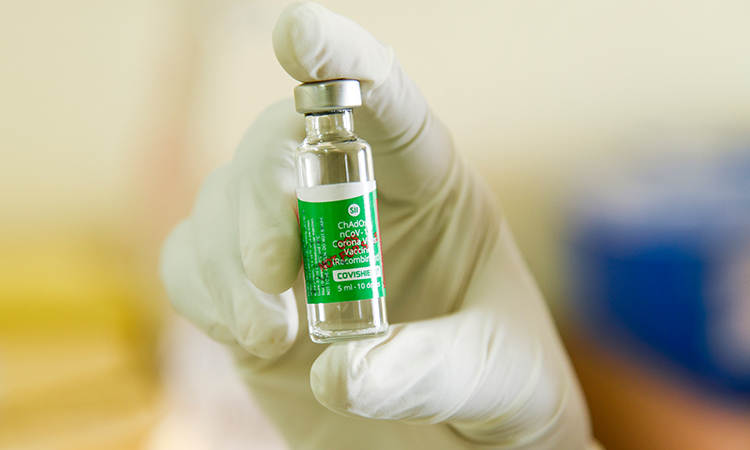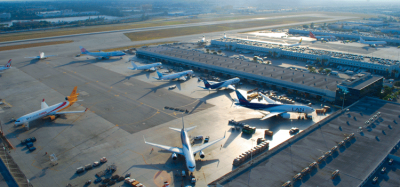Stepping up to facilitate the transportation of the COVID-19 vaccine
- Like
- Digg
- Del
- Tumblr
- VKontakte
- Buffer
- Love This
- Odnoklassniki
- Meneame
- Blogger
- Amazon
- Yahoo Mail
- Gmail
- AOL
- Newsvine
- HackerNews
- Evernote
- MySpace
- Mail.ru
- Viadeo
- Line
- Comments
- Yummly
- SMS
- Viber
- Telegram
- Subscribe
- Skype
- Facebook Messenger
- Kakao
- LiveJournal
- Yammer
- Edgar
- Fintel
- Mix
- Instapaper
- Copy Link
Posted: 24 February 2021 | Rajeev K. Jain | No comments yet
Rajeev K. Jain, Chief Executive Officer of Mumbai International Airport Ltd. (MIAL), operator of Chhatrapati Shivaji Maharaj International Airport (BOM) in Mumbai, tells International Airport Review about what it takes to ensure the efficient and temperature-controlled storage and transportation of the COVID-19 vaccine and how the airport is emerging as the premier hub for vaccine distribution.


Mankind has always proven its resilience in the face of insurmountable challenges, even one such as the unprecedented COVID-19 pandemic that swept across the globe in 2020. Standing united in the fight against the virus, countries mobilised quickly to curb its spread, while simultaneously initiating the movement for creating and distributing a vaccine to protect against coronavirus. As the world’s biggest vaccine maker that is responsible for manufacturing more than 60 per cent of all vaccines sold globally, India has already witnessed the introduction of two indigenously created vaccines that are approved for distribution in addition to those manufactured by other countries.
The air cargo community remained fully functional to cater to the greater need to mobilise and supply essential life-saving items”
Since the outbreak of the pandemic, airports around the world have witnessed an unprecedented decline in passenger flight operations. However, the air cargo community remained fully functional to cater to the greater need to mobilise and supply essential life-saving items. Despite the resumption of domestic aviation, the restriction on international passenger flights still acts as a deterrent in the return to pre-COVID-19 levels of passenger traffic. In comparison, the Mumbai air cargo industry has achieved 90 per cent of pre-COVID-19 levels of export and import movements (EXIM) already and is expecting to bridge the gap within 2021. During this time, the cargo fraternity has also been tirelessly working towards setting forth a seamless process across road, rail, water and air, in order to ensure an efficient distribution of the vaccine in anticipation of its rollout.
Transporting the COVID-19 vaccine
We celebrated yet another momentous occasion as the first international shipments of the vaccine, carrying over 250,000 doses, departed from BOM to Bhutan and the Maldives on 20 January 2021″
13 January 2021 will always be viewed as a monumental day for the air cargo community in Mumbai. It was a moment of pride for all of us at Chhatrapati Shivaji Maharaj International Airport (BOM) to witness the first ever shipment of vaccine fly out via our airport. The standard operating procedures that we had implemented saw us processing the domestic shipment of Covishield, manufactured by the Serum Institute of India, in under seven minutes, from goods acceptance to dispatch at ramp. In under a week, we celebrated yet another momentous occasion as the first international shipments of the vaccine, carrying over 250,000 doses, departed from BOM to Bhutan and the Maldives on 20 January 2021. As a result of the joint collaboration of the entire air cargo fraternity and regulators, our team successfully processed these international shipments in under 26 minutes.
In order to better understand the logistical operation of the vaccine distribution via BOM, it is crucial to first understand the importance of the role of the airport’s existing infrastructure and developments, adopted even before the pandemic, in facilitating an end-to-end unbroken cold chain process for the storage and transportation of the COVID-19 vaccine.
The importance of temperature-controlled storage and transport
When dealing with the distribution of sensitive products like the COVID-19 vaccine, there are several challenges that needed to be considered”
When dealing with the distribution of sensitive products like the COVID-19 vaccine, there are several challenges that needed to be considered, such as assuring temperature-controlled storage and transportation to maintain the efficacy of the vaccine. As the premier pharma hub in the country, at BOM, we have state-of-the-art facilities, such as:
- Asia’s largest temperature-controlled Export Pharma Excellence Centre, with a one-time holding capacity of 800 tonnes for two to eight degrees (which can cater to cargo meant for seven freighters), and cold chambers offering storage within two to eight degrees at 300 tonnes at a time
- Asia’s largest Pharma-dedicated Import Cold Zone, offering 860 tonnes at 15 to 25 degrees at a time for Pharma import movements
- A first-of-its-kind, indigenously developed ‘Cooltainer’ facility that facilitates two to eight degree temperature-controlled transport between the cold storage terminal and the aircraft
- The airport is also the largest hub for Envirotainer movements, with over 60 power outlets for processing Pharma active containers and an exclusive station dealing with storage and maintenance of both e-type and t-type active containers.
Overall, we have well-established time and temperature sensitive handling systems that can support the requirements of all vaccines, be it those created indigenously or abroad.
Besides, BOM is also the first airport in India, and third in Asia, to achieve the International Air Transport Association’s (IATA) Center of Excellence for Independent Validators (CEIV) certification, and is the only Indian airport to have a strategic partnership with Pharma.aero. The airport also offers connectivity within 10 hours to Europe, 15 hours to America, 5.5 hours to the Far East and 5.5 hours to African destinations. Thus, we are ideally and geographically positioned to support, maintain and fully optimise digital and dedicated pharma corridors, particularly for the transportation of the COVID-19 vaccine. In light of the green signal for vaccine distribution, we have initiated flexible slot management for adhoc freighter and charter operations to provide a seamless Pharma EXIM experience for the supporting supply chain players.
A collaborative effort
Besides infrastructure and connectivity, another element that is vital for the efficient distribution of the vaccine is mass collaboration across industries and borders”
Besides infrastructure and connectivity, another element that is vital for the efficient distribution of the vaccine is mass collaboration across industries and borders. We have deployed a dedicated COVID-19 taskforce to ensure optimisation of temperature management, reduction in dwell time with prior special approvals from regulators and lower processing time in order to ensure an unbroken cold chain for the vaccine movement, from the manufacturing facility to the end distributor. An around-the-clock Customer Service Cell has also been dedicated for COVID-19 vaccine EXIM consignments in order to address customer queries, pre-alerts and status updates. The Air Cargo team at BOM ensures end-to-end logistics, disseminating information on all of the developments at the airport, and building the confidence of customers and stakeholders on the efficient and seamless transportation of the COVID-19 vaccine across all borders.
In the wake of the pandemic, BOM is currently witnessing an average of about 15 cargo flights daily, wherein we handle an average of 800 tonnes of export and 700 tonnes of import cargo per day. By providing a round-the-clock green channel for the smooth trans-shipment of the vaccine, to date, we have facilitated a cumulative delivery of over six million doses across 26 destinations in India, as well as approximately 16 million doses across 17 international destinations. The airport’s infrastructure and innovative solution to ensure excellent control over cargo movement in real-time and the team’s efficiency have been instrumental in ensuring seamless operations and emerging as the premier hub of the vaccine distribution.
Rajeev K. Jain is the Chief Executive Officer of Mumbai International Airport Ltd. (MIAL), which operates Chhatrapati Shivaji Maharaj International Airport (BOM). He has vast experience of the infrastructure sector, spanning steel, telecom, aluminium and airports. He joined MIAL in 2006 when the airport was privatised and has been intensely involved in ensuring the successful implementation of the project and successful operations of BOM Airport.
Related topics
Related airports
Related organisations
GVK Mumbai International Airport Ltd (MIAL), International Air Transport Association (IATA)


















